|
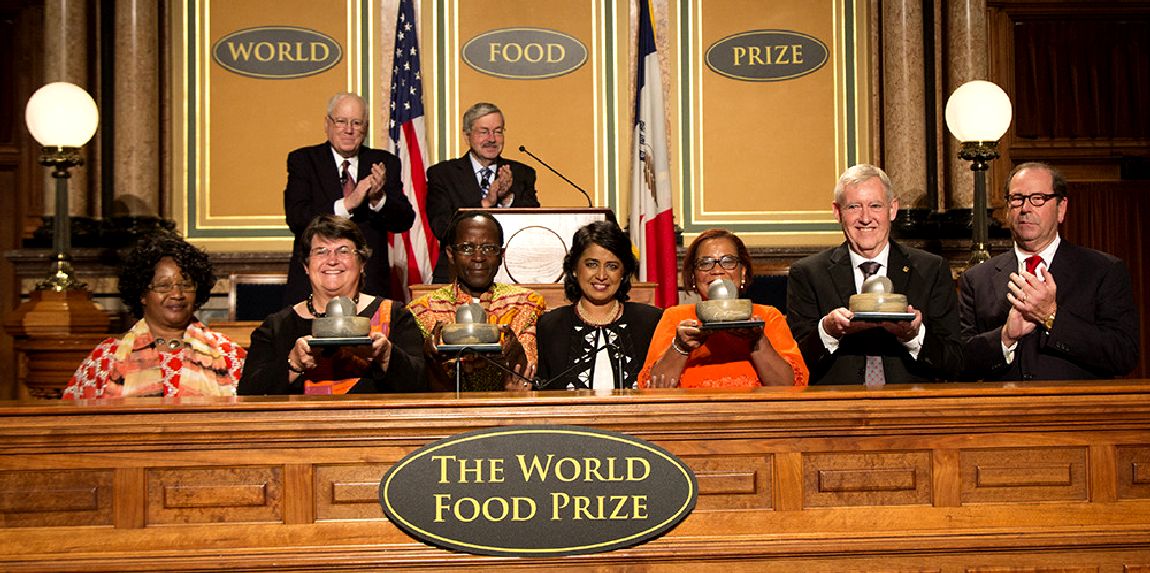
THE
WORLD FOOD PRIZE LAUREATE AWARD CEREMONY
This event is held in the
Iowa State Capitol building in Des Moines, Iowa. The ceremony rivals that of the Nobel Prize, drawing over 800 international guests. Each year, world-class performers take the stage to honor the World Food Prize Laureate, and the event is
televised and webcast live. Past performers have included Ray Charles, John Denver, Chachi Tadesse, Kathak Gunjan, the
Tokyo String Quartet, and Achinoam Nini (Noa). Following the Ceremony, the celebration continues at the Laureate Award Dinner, held in the Capitol rotunda.
The World Food Prize Foundation is currently run by Kenneth M. Quinn, former U.S. Ambassador to Cambodia.
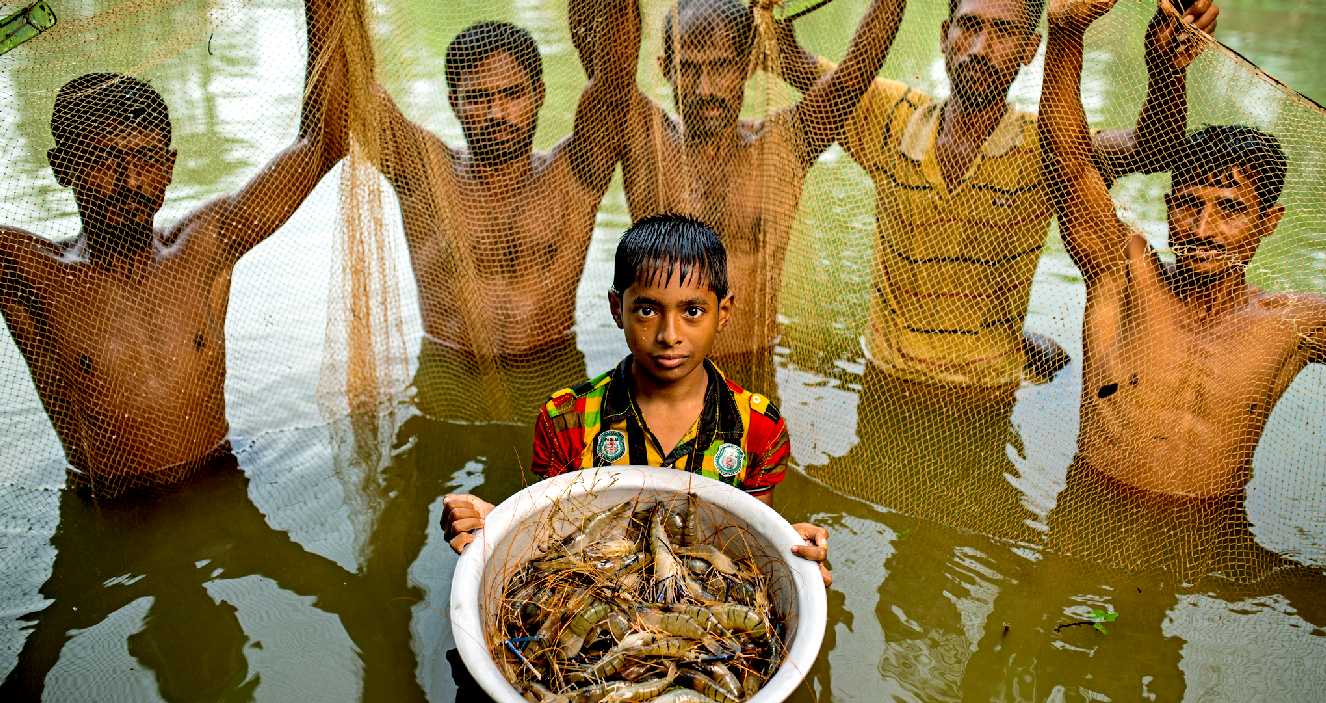
AQUACULTURE
- What is the most climate friendly way of feeding the world? Is is
agriculture or aquaculture. Where do wild fish fit into the equation?
In not too many years we will
reach saturation point when it comes to land available for us to grow food
on. When that happens tensions will rise and more than likely boil over to
conflict. It is human nature.
Many
Governments are now looking at Blue Growth and
Blue Economy schemes to try
to stave off the inevitable, in the hope that the most intelligent species
on planet Earth will be able to moderate itself. With that firmly in mind,
Bluebird Marine Systems is trying to help all nations make the best of the oceans
that lap at their shores.
SeaVax
is a small versatile ship that can be adapted to recover spilt oil and catch
fish or fish food, but the main reason for developing such an innovative
vessel is to capture plastic
waste, not fish,
and certainly not
smaller marine life.
We
believe that all of the measures identified and proposed below are
necessary if the world is to achieve a truly Circular Economy for a
sustainable future.
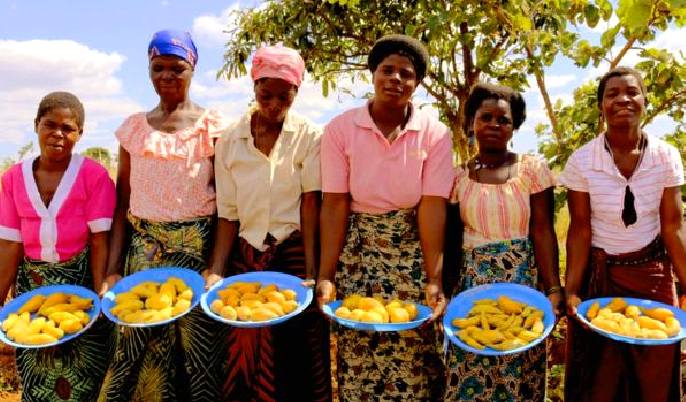
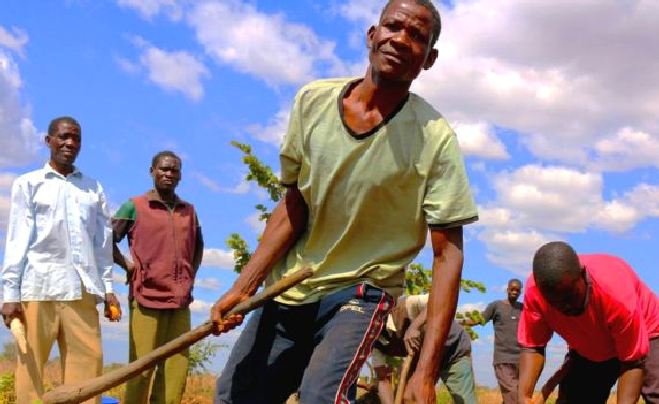
BBC
NEWS 13 OCTOBER 2016
Four scientists have been awarded the 2016 World Food Prize for enriching sweet potatoes, which resulted in health benefits for millions of people.
They won the prize for the single most successful example of biofortification, resulting in Vitamin A-boosted crops.
Since 1986, the World Food Prize aims to recognise efforts to increase the quality and quantity of available food.
The researchers received their US $250,000 (£203,000) prize at a ceremony in Iowa, US, on Thursday.
Three of the 2016 laureates - Drs Maria Andrade, Robert Mwanga and Jan Low from the CGIAR International Potato Center - have been recognised for their work developing the vitamin-enriched orange-fleshed sweet potato (OFSP).
The fourth winner, Dr Howard Bouis who founded HarvestPlus at the International Food Policy Research Institute, has been honoured for his work over 25 years to ensure biofortification was developed into an international plant breeding strategy across more than 40 countries.
'Science matters'
Announcing this year's winners, USAID administrator Gayle Smith said: "These four extraordinary World Food Prize Laureates have proven that science matters, and that when matched with dedication, it can change people's lives."
Vitamin A deficiency (VAD) is considered to be one of the most harmful forms of malnutrition in the developing world. It can cause blindness, limits growth, weakens immunity and increases mortality.
The condition affects more than 140 million pre-school children in 118 nations, and more than seven million pregnant women. It is said to be the leading cause of child blindness in developing countries.
The World Health Organization describes biofortification as the process "by which the nutritional quality of food crops is improved through agronomic practices, conventional plant breeding, or modern biotechnology".
It observes: "Biofortification may therefore present a way to reach populations where supplementation and conventional fortification activities may be difficult to implement."
The World Food Prize ceremony will take place during the the Borlaug Dialogue International Symposium, a three-day gathering in Des Moines, Iowa, named after Nobel Peace Prize winner Norman Borlaug.
Dr Borlaug, often called the father of the Green Revolution, established the World Food Prize 30 years ago to recognise "exceptionally significant" achievements by individuals. In 1970, Dr Borlaug won the Nobel Peace Prize in recognition of his contribution to world peace through his work to increase global food supplies.
A report published at the Borlaug Dialogue warned that growth in global agricultural productivity (GAP), for the third year in a row, was not advancing at the rate required to meet future demand for food.
The Global Harvest Initiative's (GHI) seventh annual GAP report warned that unless this emerging trend was reversed, the "world may not be able to sustainably provide the food, feed, fibre and biofuels needed for a booming global population".
According to the GHI, GAP needed to increase by at least 1.75% each year. However, its latest figures showed that the current rate was only 1.73%.
The authors observed that productive techniques and technology were "essential for producers of all scales as climate change and extreme weather events threaten the sustainability of agricultural value chains".
GHI executive director Dr Margaret Zeigler said the agriculture sector had the potential to be a "climate change mitigation powerhouse".
She added: "Private sector investment, investment and scale will help more farmers, ranchers and forest managers access tools and practices that contribute to a low-carbon agricultural system."
Conflict and hunger
Another factor that was affecting regions' ability to produce food was conflict and civil unrest. One of the topics at the 2016 Borlaug Dialogue is the issue of national security and food security in affected regions.
Kenneth Quinn, former US ambassador to Cambodia and president of the World Food Prize Foundation, told BBC News:
"Just as factors like climate volatility, water scarcity, inferior infrastructure and post harvest loss can affect farmers' yields and food reaching urban centres, so too can military conflict and political instability disrupt markets, impede distribution of new technologies and innovations to farmers and halt new rural investment."
He added: "Throughout my diplomatic career, I have seen the incredible transformative power of agricultural development to undercut the allure and recruiting ability of radical terrorist organisations in remote areas."
One scientist who had first-hand experience of the impact of war on agricultural research was Mohmoud Solh, director-general of the International Center for Agricultural Research in Dry Areas (Icarda).
He explained how the Syrian civil war ripping the country apart had forced his team of researchers to leave the country.
Also left behind was Icarda's seed bank in Aleppo, which contained a vast array of samples from many species of staple food crops' wild relatives, which may hold the genes required to produce future generations of climate-proof crops. Most of which were collected from the "fertile crescent", which is widely considered to be the birthplace of modern agriculture.
However, Dr Solh told BBC News that the team was now continuing its work in Morocco and Lebanon.
But he added that he would have a clear message in his speech to delegates at the Borlaug Dialogue.
"You can see the importance of supporting before they reach that stage, the point I want to say is that the upheaval is not just political - it is because of poverty, lack of jobs and food insecurity.
"Many of the migrants are not just because they are leaving security hotspots, it is because there are few or no opportunities for them or their families.
Dr Solh added: "Sustainable development is needed. Proper investment is needed to ensure people have jobs and a future, otherwise the problems will mushroom."
On Tuesday, the publishers of the Global Hunger Index warned that the international community was not making enough progress to end world hunger by 2030, which is one of the
UN Sustainable Development Goals.
"The world has made progress in the fight against hunger but it has so far been too slow," observed Rose Caldwell, executive director of humanitarian organisation Concern Worldwide UK.
"Hunger continues to waste lives and limit potential - we need urgent action from the global community to wipe it out for good."
The latest Index in the ongoing series - produced by Concern Worldwide, the International Food Policy Research Institute and
German NGO Welthungerhilfe - suggested that if the decline in global hunger rates continued to decline at the rates recorded since the early 1990 then at least 45 nations, including Pakistan, Zimbabwe and Afghanistan, would still have "moderate" to "alarming" hunger scores in 2030.
By Mark Kinver
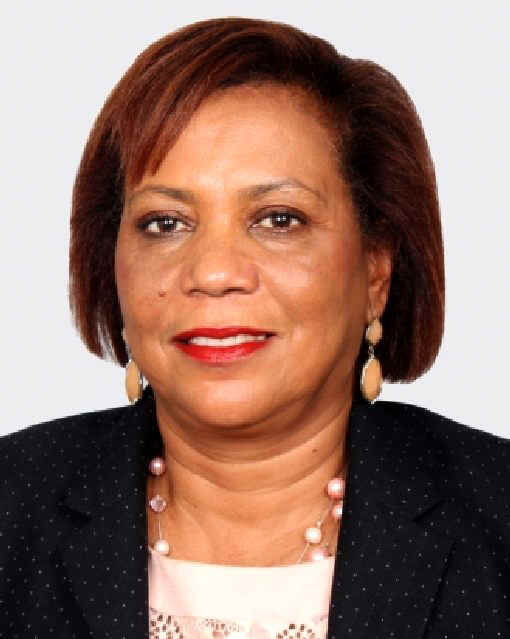
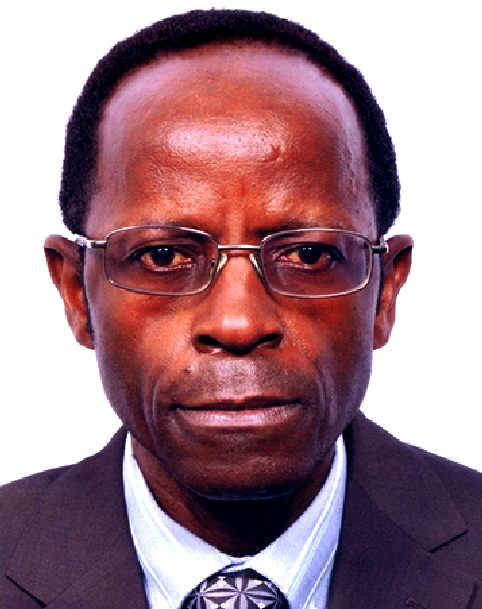
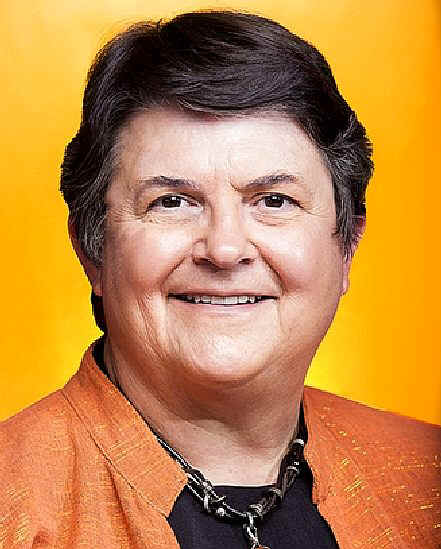
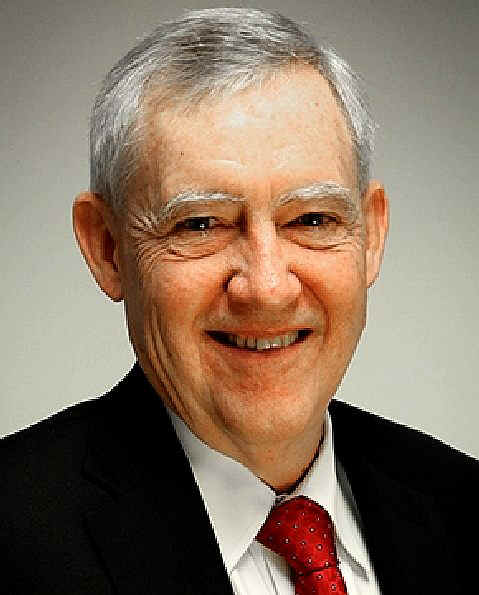
WFP
2016 WINNERS
- World Food Prize Laureates, Dr. Maria Andrade [left] of Mozambique, Dr. Robert Mwanga
[centre left] of Uganda and Dr. Jan Low [centre right] of the United States, are all members of the International Potato Center. The fourth WFP recipient, Dr. Howarth Bouis
[right] of the U.S., is the founder of HarvestPlus of the International Food Policy Research Institute.
CATHOLIC REPORTER DES MOINES IOWA OCT 13 2016
Biofortification is the word that links this year's four World Food Prize winners receiving the annual award Oct. 13 in Des Moines, Iowa.
According to the World Health Organization, "Biofortification is the process by which the nutritional quality of food crops is improved through agronomic practices, conventional plant breeding, or modern
biotechnology.
Together these laureates created a chain of innovative efforts stretching from the lab bench directly to the home table. All four winners have dedicated their lives to the effort of developing enriched foods eaten and grown locally with potentially more vitamins and micronutrients. The numerous barriers to acceptance of such ideas by farmers used to growing nutritionally poor yet traditional crops, was one of many standing in the way to moving families out of starvation. Now farmers and city dwellers who live in poverty and drought stricken areas of the planet can have access to food not void of crucial micronutrients and vitamins necessary for human development.
Plant scientists Andrade and Mwanga are responsible for breeding the most successful example of a nutrient-enriched food through the use of the humble North American sweet potato.
Andrade began her efforts in Mozambique using genetic material from the International Potato Center. She worked over 20 years; her earliest efforts began in response to flooding in Mozambique in 2000. However, she quickly realized that areas of the country also experienced devastating drought and turned her efforts to developing varieties that could withstand drought as well. Her potatoes were used in different locations depending on climate conditions by small-scale farmers. There are now 15 varieties available.
Mwanga became a vocal advocate in Uganda for the beta carotene rich sweet potato, seeking to overturn use of the nutrient inferior white sweet potato traditionally used by farmers. His work through the International Potato Center opened up areas of interest where the improved variety of orange-fleshed sweet potato could become a major part of his country's diet. He eventually extended OFSP into parts of east and central
Africa. Over a 30-year career, he has sought to breed OFSP that addresses problems in the field such as major virus diseases and weevils that can cause up to 100-percent crop loss during drought. This also enabled him to better understand the molecular and genetic codes which improve breeding strategies.
As a Peace Corps volunteer, Low saw early on how a nutritious diet could improve income for a family as well as their health. This led to her efforts later in her career to embark on a quest to supply enough data as sufficient evidence to farmers and their governments to take the risk of growing the biofortified sweet potato as a way to reduce Vitamin A deficiency among children under the age of 5.
"It seems a no-brainer," she said, "that a diverse diet is the secret to good nutrition, but actually getting sectors such as agriculture and health to work together is easier in theory than in practice."
Vitamin A deficiency has been a scourge throughout sub-Saharan Africa for decades
- the leading cause of blindness in children. With its usual treatment dosed through capsules as a supplement and given out to entire villages at $1 USD each, the cost proved expensive over decades. It became crucial for a multi-sector approach to such foreign aid that could be more cost-effective.
This is where the fourth World Food Prize laureate comes in. Bouis pushed back against the idea that vitamin supplementation was the only way to increase a village's nutrition. He was convinced that farmers could grow their own vitamins if given access to such biofortified plants along with the education necessary to use them.
"You have to have value for the farmer," he said. "Since women are the farmers in these countries, once you show that it's the same maize at the same cost, but is better for their families, and tastes good, they will adopt."
The result across the world has been nothing less than game changing, increasing the number of people making their way up into the middle class of their communities. Not only are they able to grow food for themselves but one day, the hope is that there will be enough for exportation.
Through the cooperative efforts of local, national and international organizations, iron and zinc fortified beans, rice, pearl millet and wheat, as well as the orange-fleshed sweet potato, maize and cassava, all enriched with vitamin A through plant breeding, are being distributed and tried in over 40 countries.
This year, the World Food Prize award of $250,000 will be split four ways when awarded Oct. 13 at the World Food Prize building in Des Moines, Iowa. A protest against the agricultural use and development of genetically modified foods will also be held that evening.
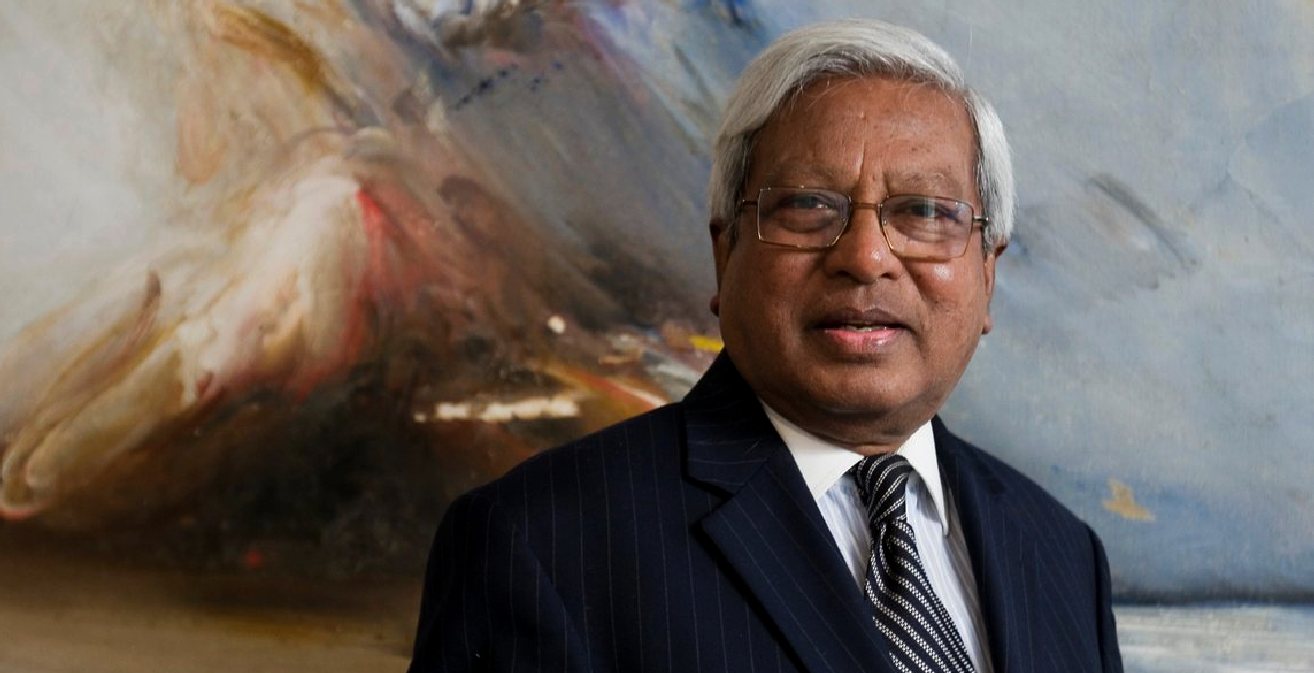
THE
TELEGRAPH 2
JULY 2015
Sir Fazle Hasan Abed, the founder of Brac, the largest non-governmental organisation on the planet, has been awarded the 2015 World Food prize for his “unparalleled” work on reducing poverty in Bangladesh and 10 other countries.
Abed established Brac – formerly known as the Bangladesh Rural Advancement Committee – in 1972 as a relief operation to help the country recover from its war of independence with Pakistan and the destruction wrought by a tropical cyclone.
The organisation’s focus soon switched to finding new ways to tackle poverty and
empower women socially and economically, and it is estimated to have brought nearly 150 million people out of poverty since its foundation.
Today, it has a staff of 110,000 and works in 11 countries: Bangladesh,
Afghanistan,
Pakistan, the Philippines, Sri Lanka,
Liberia,
Sierra
Leone, South Sudan, Tanzania, Uganda and Haiti.
Dr MS Swaminathan, chair of the World Food prize selection committee and the first World Food prize laureate in 1987, described Abed as a “strategic thinker, and a man with a future vision”. He also praised the NGO for its constant
innovation and bold use of funding.
It's a great satisfaction for us to to receive recognition of the work we’ve done for the last 43 years
Fazle Hasan Abed
“While funding was important, Abed realised that the organisation needed some internal financial resources in order to steer its course, rather than become diverted by donor agendas,” he said.
“He therefore set up a considerable number of commercial enterprises as part of the Brac ‘brand’. These include printing presses, manufacturing industries, a hotel, conference facilities, retail outlets and the private Brac University, among others. Surpluses from these enterprises go into supporting Brac’s development programmes.”
Abed, who was knighted by the Queen in 2010, described the award as a “tremendous honour”, adding: “I’m sure this will be a great joy for our staff and energise them even more. It’s a great satisfaction for us to receive recognition of the work we’ve done for the last 43 years.”
He said he was particularly proud of Brac’s work on tackling child mortality in Bangladesh in the 1980s, which saw the number of deaths halved over a decade.
Brac's work on tackling child mortality in Bangladesh in the 1980s saw the number of deaths halved over a decade.
“We went to every household in Bangladesh teaching mothers how to make oral rehydration fluid at home to combat diarrhoeal deaths,” he said.
“That also made it possible for Brac to become a very large organisation very quickly and to expand our programmes throughout the country.”
Equally productive, he said, had been Brac’s push to raise the rates of child immunisation in the last few years of the same decade. Between 1986 and 1990, the proportion of immunised Bangladeshi children rose from 2% to 70%. In the areas where Brac works, he added, the immunisation rate is now at 95%.
Abed said that although Brac’s approach is multifaceted, it was founded on a simple principle.
“We have worked on many different aspects of poverty: mortality reduction; maternal mortality and health; family planning; financial services for women; women’s empowerment; agriculture, and all kinds of livelihoods for poor people so that they could come out of extreme poverty and malnutrition,” he said.
“Everything we did in Bangladesh we did with one focus: getting poor people out of poverty because we feel that poverty is dehumanising.”
With the world preparing to adopt the sustainable development goals – which will replace the millennium development goals and set the global development agenda for the next 15 years – Abed called for a renewed focus on eliminating extreme poverty.
He said that Brac’s work with the poorest 8% of Bangladeshis had shown that even the ultra-poor could be reached if sufficient resources and commitment were available. Brac’s two-year programme, designed to help those who are too poor for microfinance loans, involves using grants, monthly stipends and health services to support families while they learn about making money and household budgeting.
The programme has since been rolled out in several countries – Ghana, Ethiopia,
India, Pakistan, Honduras and Peru –where it has also proved successful.
“Taking people out of extreme poverty can be done but you need the commitment to do it in every country throughout the world,” said Abed.
“That’s the problem – do we have the commitment in every country to take the extreme poor out of their misery? Do we have good governance in every country? There are many factors that affect development and hopefully these will also be part of the sustainable development goals: good governance and the eradication of corruption from societies.”
By Sam
Jones
ABOUT
THE WORLD FOOD PRIZE
The World Food Prize is the foremost international award recognizing
- without regard to race, religion, nationality, or political beliefs - the achievements of individuals who have advanced human development by improving the quality, quantity or availability of food in the world.
The Prize recognizes contributions in any field involved in the world food supply
- food and agriculture science and technology, manufacturing, marketing, nutrition, economics,
poverty alleviation, political leadership and the social sciences.
The World Food Prize emphasizes the importance of a nutritious and sustainable food supply for all people. By honoring those who have worked successfully toward this goal, The Prize calls attention to what has been done to improve global
food security and to what can be accomplished in the future.
Dr. Norman E. Borlaug, winner of the Nobel Peace Prize in 1970 for his work in world agriculture, envisioned a prize that would honor those who have made significant and measurable contributions to improving the world's food supply. Beyond recognizing these people for their personal accomplishments, Borlaug saw The Prize as a means of establishing role models who would inspire others. His vision was realized when The World Food Prize was created in 1986.
Since then, The World Food Prize has honored outstanding individuals who have made vital contributions to improving the quality, quantity, or availability of food throughout the world. Laureates have been recognized from countries around the world, including Bangladesh,
Brazil, China,
Cuba, Denmark, Ethiopia, India,
Mexico, Sierra Leone,
Switzerland, the
United
Kingdom, the United Nations and the
United
States.
The World Food Prize is sponsored by businessman and philanthropist John Ruan and is located in Des Moines, Iowa. Mr. Ruan stepped forward to endow The Prize in 1990 when its first sponsor withdrew.
The prize was first funded by General Foods. Without Mr. Ruan's generosity, The Prize and Dr. Borlaug's vision could not have continued. Today John Ruan's son, Mr. John Ruan III, has succeeded his father as chairman of the World Food Prize. The Foundation's president is Ambassador Kenneth M. Quinn. A Council of Advisors provides guidance and support.
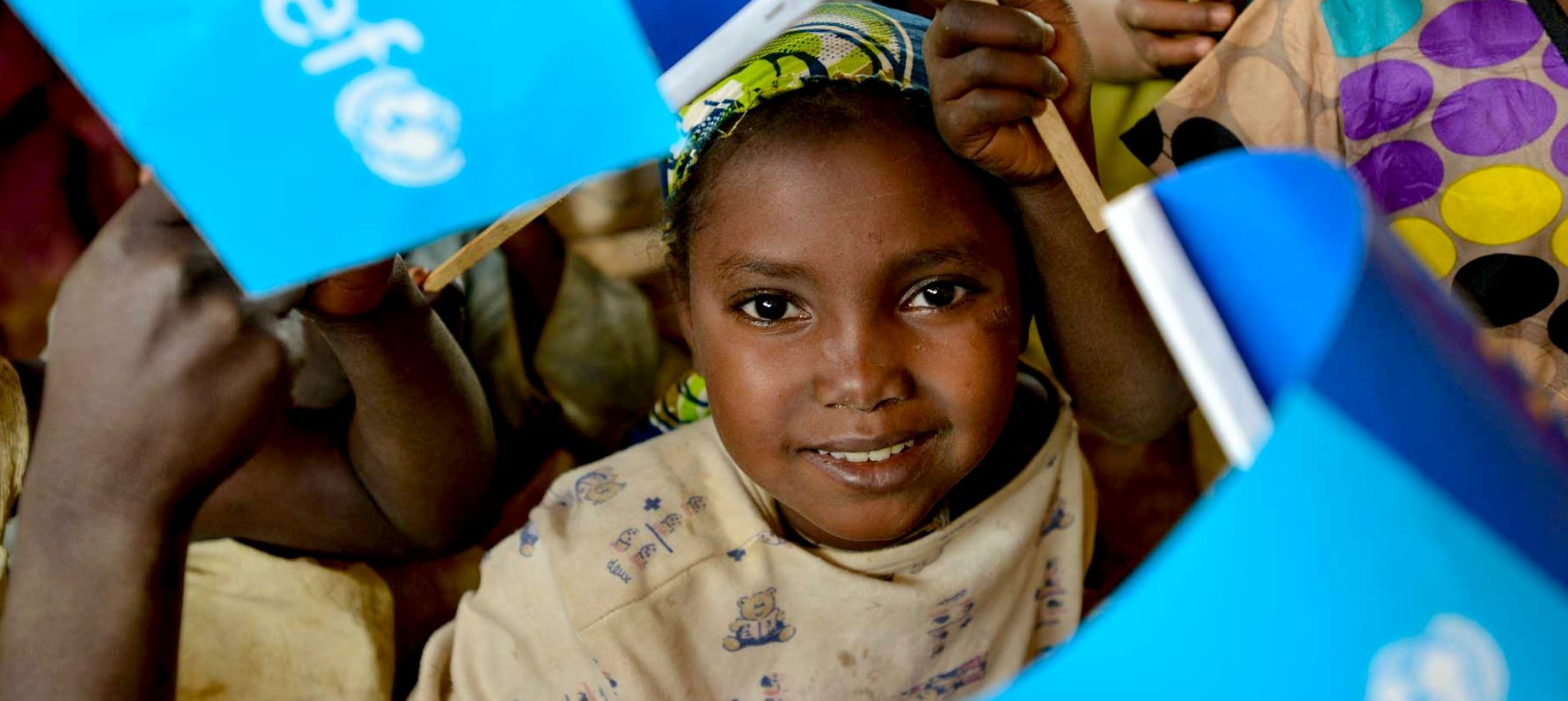
THE HALL OF LUAREATES
The World Food Prize Hall of Laureates is located in the former Central Library on the Principal Riverwalk in downtown Des Moines, Iowa, which was constructed in the early 1900s as part of the City Beautiful movement.
The World Food Prize Hall of Laureates honours the dreams of Norman Borlaug, recipient of the Nobel Peace Prize in 1970 and founder of the World Food Prize, and those of John Ruan, a Des Moines businessman. John Ruan had envisioned Des Moines as the "food capital of the world", and advocated for a World Trade Center to be built in the city in the 1980s. Such a center was never built, but Ruan's endowment of the World Food Prize in 1990 set in motion a goal to secure a home for such an organization. John Ruan III began the fundraising efforts with a donation of $5
million from his family in 2001. Ten years and $30 million later, the renovation was finished in time for the 25th anniversary of the World Food Prize. The original staircase to the east entrance had been removed in 1955 but was restored during the renovation. Also restored was the acroterium which had been destroyed in the mid-1930s.
A portion of project funding was devoted to commissioning dozens of pieces of artwork by artists from Iowa and around the world to be displayed in the building. In addition, a new fountain and statues of John Ruan and Norman Borlaug can be found in the gardens on the west side of the building.
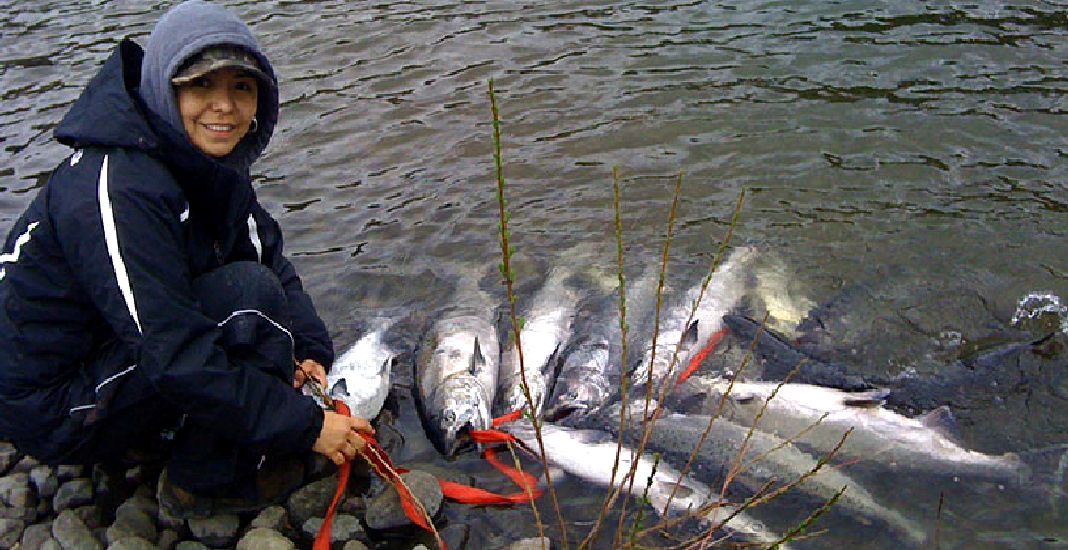
SALMON
- Fish that swim in plastic polluted waters are likely to be contaminated
and carry with them that contamination for the people who fish for them.
Fish that are farmed, such as salmon, run the risk of upsetting the
balance of nature.
WORLD FOOD PRIZE HISTORY
Conceived by Nobel Peace Prize Laureate Norman Borlaug, the prize emphasizes the importance of a nutritious and sustainable food supply for all people. Borlaug saw the prize as a means of establishing role models who would inspire others.
In 1985, Borlaug met with the chief executive of General Foods Corporation, James Fergusen. Norman Borlaug presented his long standing desire for the establishment of a major prize for agriculture. The idea of a prize was met favourably by the Senior General Foods Management, but they expanded the scope of the prize to include all of the links of the food chain - from farm to table. General Foods Corporation organized a prize management structure and in 1986 announced the founding of the General Foods World Food Prize. This prize was funded solely by the General Foods Fund for the first four years of its existence, and partially funded by the General Foods Fund and other contributors in the fifth year.
Since 1990, the World Food Prize has been sponsored by businessman and philanthropist, John Ruan.
Laureates are honoured and officially awarded their prize in Des Moines, Iowa, in a televised award ceremony held in the House Chamber of the Iowa State Capitol. The Award Ceremony coincides with the Norman E. Borlaug International Symposium, known as the Borlaug Dialogue, which addresses an issue related to hunger and food security each year. Past symposia have focused on the promises and challenges presented by biofuels for global development, the dual challenges of malnutrition and obesity, water insecurity and its impact on development and stability in the Middle East, and "The Green Revolution Redux: Can We Replicate the Single Greatest Period of Hunger Reduction in All Human History?".
In 2008, the World Food Prize Foundation received a $5 million contribution from Monsanto to ensure the continuation of the annual World Food Prize International Symposium "Borlaug Dialogue". The funds supported a renewed fundraising campaign to transform the historic and former central Des Moines Public Library building into a public museum, the Hall of Laureates, to honor Norman Borlaug and the work of the World Food Prize laureates.
The 2013 Borlaug Dialogue was held 16–19 October 2013.
WFP
SPONSORS
The Governor and The State Legislature of Iowa • Iowa Economic Development Authority
John Deere Foundation • John Ruan Foundation Trust • Claudia and Paul Schickler
The Mathile Institute for the Advancement of Human Nutrition • The Rockefeller Foundation
DuPont Pioneer • Howard G. Buffett Foundation • Kemin Industries • Land O'Lakes • Monsanto
Janis and John Ruan III • Ruan Transportation Management Systems
AGCO Corporation • Archer Daniels Midland Company • Bankers Trust • Bayer CropScience
Margo and Don Blumenthal • Bravo Greater Des Moines • Bridgestone Firestone • Gregory and Suzie Glazer Burt
Cargill • CHS Foundation • CropLife International • Dairy Management, Inc. • Diamond V • Dow AgroSciences
Elanco • First Citizens Charitable Foundation • FMC Corporation • General Mills • Hormel • Hy-Vee, Inc
Iowa Corn Promotion Board and Iowa Corn Growers Association
Iowa Farm Bureau Federation and Farm Bureau Financial Services • Iowa Pork Foundation
Iowa Soybean Association • Iowa State University • Kellogg Company • Meredith Corporation
MidAmerican Energy • Novozymes • OCP Research LLC • Osmundson Manufacturing Company • PepsiCo
Principal Financial Group Foundation • Reynolds & Reynolds, Inc. • Sasakawa Africa Association
Sehgal Family Foundation • Soyfoods Council • Sukup Manufacturing • Syngenta Corporation • Syngenta Foundation
Ted Crosbie Memorial • The Mosaic Company • United Soybean Board • USDA Agricultural Research Service
Wallace Genetic Foundation • Walmart • West Central and REG • Wild Rose Entertainment
William C. Knapp Charitable Foundation • World Initiative for Soy in Human Health • W.K. Kellogg Foundation
W.T. and Edna M. Dahl Trust
DLL • Eurofins • Harrisvaccines • Sharon and Landis Martin • Mauerberger Foundation Fund of South Africa
Mercedes-Benz of Des Moines • Merchant Investments, Inc. • Musco Sports Lighting • Arthur Neis
Prairie Meadows Casino and Racetrack • RTI International • Linda and Tom Schaefer • Helen and Maurice Sinclair
Stine Seed Company • The Waldinger Corporation • Urban Charitable Foundation
BCC Advisers • Beaverdale Books • Boesen The Florist • Harry and Pamela Bass Bookey • Anne and Neil Broderick
Jake Christensen and Susan Fitzsimmons • Patty and Jim Cownie • Barbara and Ronald Eckoff • Essex Meadows
Dorie and David Fisher • Roswell and Elizabeth Garst Foundation • Karen and Bill Hess • Mary Ann and John Hicks
Elizabeth and David Hoak • Devlin Hogans • Trudy and David Hurd • International Traders of Iowa
Iowa Savings Bank • Iowa State Education Association • Iowa State Bank • Lori and Sam Kalainov
Margaret and Tom Mehl • May May Ng • Le Chi Nguyen • Jane and Steve Noah • Denise and Larry Oliphant
Le Son and Kenneth Quinn • Raven Industries • William Sellner • Emily and Fred Weitz • John Williams
If you are interested in becoming a donor, please contact Mashal Husain at
mhusain@worldfoodprize.org
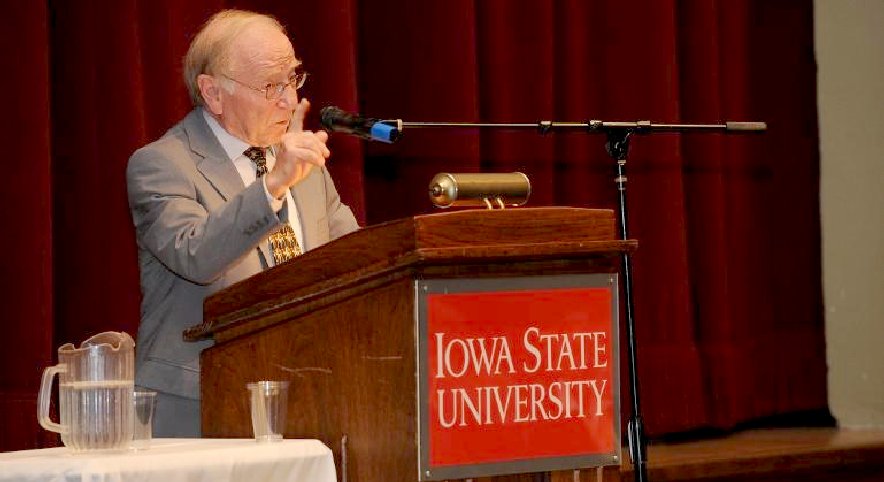
DANIEL
HILLEL - Speaking at Iowa State University in October 2012. Dr.
Hillel is an Israeli soil scientist who developed drip irrigation techniques for use in desert
agriculture. He was named the 2012 recipient of the World Food Prize, honoring "individuals who have advanced human development by improving the quality, quantity or availability of food in the world."
Dr. Daniel Hillel, 82, a research scientist at Columbia University's Earth Institute, will receive the $250,000 award Thursday at the state capitol in Des Moines. His work with the
NASA Goddard Institute for Space Studies on the adaptation of agriculture to climate change has been promoted globally through the World Bank, U.N. Food and Agriculture Organization, and USAID.
Living in an arid climate gave Hillel firsthand knowledge of how important water preservation would be to the future. Growing up in Palestine, Hillel, who was born in Los Angeles, gained a lifelong appreciation of the land and the need to protect its vital resources, according to his biography.
After earning a doctorate in soil physics and ecology at Hebrew University of Jerusalem and post-doctoral work at the University of California, Hillel returned to Israel, where he lived in a small kibbutz in the highlands surrounding the Negev Desert. It was there Hillel developed a way of using a low-volume, high-frequency, calibrated water supply for plantings. The years that followed would provide ample opportunities for him to bring water irrigation to the Israeli desert and to his Arab neighbors as well as he traveled throughout the region, encouraging the use of his drip irrigation methods.
"His research led to a dramatic shift away from the traditional method of irrigation," Ambassador Kenneth M. Quinn, president of the World Food Prize Foundation, said at a ceremony in June, when Hillel was announced as the 2012 laureate. Quinn continued:
Traditional methods utilized periodic episodes of flooding to saturate the soil, followed by longer periods of drying out the land. Instead, our laureate's new innovative method applies water in small but continuous amounts directly to plant roots with dramatic results in both increased productivity and enhanced water conservation.
Since this initial achievement in Israel, this new system of irrigation has been spread around the world, impacting thousands and thousands of farmers and producers in more than 30 countries.
In conjunction with the World Bank and other international development organizations, our laureate has worked in several Middle Eastern countries, as well as in Turkey, Pakistan, Sudan and within Palestinian communities, to spread this new technology to all who could benefit from it. As he did so, he built friendships which promoted both agricultural development and greater intercultural understanding. Indeed, while our foundation never reveals the names of persons who submit nominations for our prize, it is significant that several of the letters supporting his nomination came from individuals and institutions in Egypt, Jordan and the United Arab Emirates.
"He is probably the most well-known soil scientist in the world," Cynthia Rosenzweig, a former graduate student of Hillel's and head of the Climate Impacts Group at the NASA Goddard Institute for Space Studies, told The Jewish Week in September 2010. "He really is the father of sustainable water management."
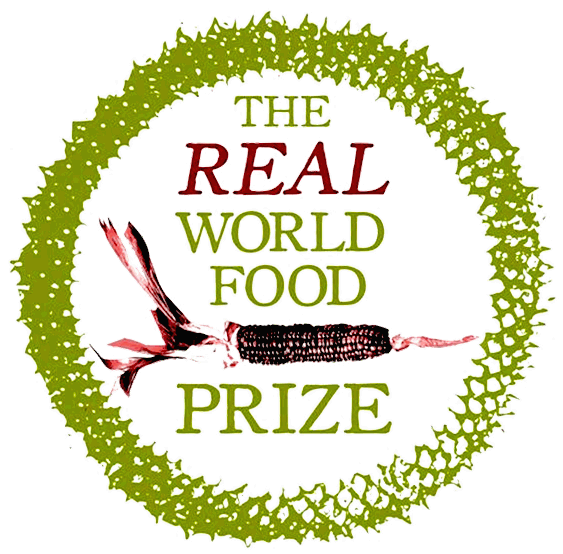
THE
REAL WORLD FOOD PRIZE - SEED FREEDOM, REAL FOOD HEROES -
2013
In a joint statement 81 Members of the World Future Council and Recipients of the Right Livelihood Award have condemned the selection of GMO scientists and company executives (from Monsanto and Syngenta) as winners of The World Food Prize 2013. See their statement below. Here Frances Moore Lappé and Vandana Shiva voice their outrage:
CHOICE OF MONSANTO BETRAYS WORLD FOOD PRIZE PURPOSE, SAY GLOBAL LEADERS
In honoring the seed biotechnology industry, this year’s World Food Prize — to many, the most prestigious prize in food and agriculture — betrays the award’s own mandate to emphasize “the importance of a nutritious and sustainable food supply for all people.”
The 2013 World Food Prize has gone to three chemical company executives, including Monsanto executive vice president and chief technology officer, Robert Fraley, responsible for development of genetically modified organisms (GMOs). Almost twenty years after commercialization of the first GMO seeds, most are not engineered to enhance nutrient content, but to produce a specific pesticide or to resist a proprietary herbicide, or a combination of these traits. But even in reducing weeds, the technology is failing, for it has generated herbicide-resistant “super weeds” now appearing on nearly half of American farms.
GMO seeds undermine sustainability in several other ways as well.
While profitable to the few companies producing them, GMO seeds reinforce a model of
farming that undermines sustainability of cash-poor farmers, who make up most of the world’s hungry. GMO seeds continue their dependency on purchased seed and chemical inputs. The most dramatic impact of such dependency is in India, where 270, 000 farmers, many trapped in debt for buying seeds and chemicals, committed suicide between 1995 and 2012.
GMOs also threaten sustainability because they continue agriculture’s dependence on diminishing and damaging fossil fuels and mined minerals, as well as water.
This award not only communicates a false connection between GMOs and solutions to hunger and agricultural degradation, but it also diverts attention from truly “nutritious and sustainable” agroecological approaches already proving effective, especially in the face of extreme weather. The Rodale Institute, for example, found in its 30-year study, that organic methods outperformed chemical farming during drought years by as much as 31 percent. Organic methods can use 45 percent less energy and produce 40 percent less greenhouse gases.
Further evidence from around the world is showing how ecological methods dramatically enhance productivity, improve nutritional content of crops, and benefit soil health, all without leaving farmers dependent on ever-more expensive inputs. The United Nations, through its Office of the Special Rapporteur on the Right to Food, has documented ecological agriculture’s potential in hungry regions to double food production in one decade. Chaired by former World Food Prize awardee Dr. Hans Herren, the 2008 International Assessment of Agricultural Knowledge, Science and Technology for Development (IAASTD) report, developed by 400 experts and endorsed by 59 governments, calls for redirection of agricultural development toward such sustainable practices. Across the world, agroecology and food sovereignty are emerging solutions shaped and chosen by scientists and citizens worldwide.
Note that the World Food Prize mandate is also to recognize contributors to food “for all people” but GMO seeds make this goal harder to reach. Most GM crops are used for feed, for livestock, processed food, or fuel – products not accessible to hungry people. Moreover, the planet already produces more than enough food for all; yet today 870 million people still suffer from extreme, long-term undernourishment because they lack power to access adequate food. Developed and controlled by a handful of companies, genetically engineered seeds further the concentration of power and the extreme inequality at the root of this crisis of food inaccessibility. Monsanto, for example, controls 90 percent of the U.S. soybean crop and 80 percent of its
corn crop and cotton crop.
The choice of the 2013 World Food Prize is an affront to the growing international consensus on safe, ecological farming practices that have been scientifically proven to promote nutrition and sustainability. Many governments have rejected GMOs, and as many as two million citizens in 52 countries recently marched in opposition to GMOs. In living democracies, discounting this knowledge and these many voices is not acceptable.
SIGNATORIES - 29 COUNCILLORS OF THE WORLD FUTURE COUNCIL
(An asterisk indicates the person is also a Right Livelihood Award Laureate but listed only once.)
*Vandana Shiva, Founder, Research Foundation for Science, Technology and Ecology
*Frances Moore Lappé, Co-founder, Small Planet Institute
*Maude Barlow, National Chairperson of the Council of Canadians
*Dipal Barua, Founder and Chairman of the Bright Green Energy Foundation
*Hans-Peter Dürr, Nuclear physicist and philosopher
*Sulak Sivaraksa, Co-founder, International Network of Engaged Buddhists
*Ibrahim Abouleish, Founder of SEKEM
*Chico Whitaker, Co-founder, World Social Forum
*Manfred Max-Neef, Director, Economics Institute, Universidad Austral de Chile
*Alyn Ware, Founder and international coordinator of the Network Parliamentarians for Nuclear Non-proliferation and Disarmament (PNND)
David Krieger, President, Nuclear Age Peace Foundation
Rama Mani, Vice Chair, Academic Council on the United Nations System
Alexander Likhotal, President, Green Cross International
Thais Corral, Co-founder, Women’s Environment and Development Organization
Pauline Tangiora, Maori elder, Rongomaiwahine Tribe
Anna Oposa, Co-Founder, Save Philippine Seas
Scilla Elworthy, Founder, Oxford Research Group, Founder, Peace Direct
Katiana Orluc, Director of Development/Strategic Affairs, Thyssen-Bornemisza, Art Contemporary (TBA21)
Riane Eisler, President, Centre for Partnership Studies
Ashok Khosla, Chairman, Centre for Development Alternatives
Hafsat Abiola, Founder and President of the Kudirat Initiative for Democracy (KIND)
Rafia Ghubash, President, Arab Network for Women, Science and Technology
Daryl Hannah, Actress and advocate for a sustainable world
Vithal Rajan, Founder, Trustee of Agriculture Man Ecology [AME], Foundation of India
Anuradha Mittal, Executive Director, The Oakland Institute
Herbert Girardet, Honorary Councillor, World Future Council
Ana María Cetto, Research professor of the Institute of Physics and lecturer at the Faculty of Sciences, Universidad Nacional Autónoma de México
Nicholas Dunlop, Secretary-General, Climate Parliament
Motoyuki Suzuki, Professor Emeritus, University of Tokyo, Japan
52 Additional Right Livelihood Award Laureates
Alice Tepper Marlin, President & Founder, Social Accountability International, USA (RLA 1990)
Alla Yaroshinskaya, Russia (RLA 1992)
Andras Biro, Hungarian Foundation for Self-Reliance, Hungary (RLA 1995)
Angie Zelter, Trident Ploughshares, United Kingdom (RLA 2001)
Annelies Allain, International Baby Food Action Network, Malaysia (RLA 1998)
Anwar Fazal, Director, Right Livelihood College, Malaysia (RLA 1982)
Bianca Jagger, Founder and Chair, Bianca Jagger Human Rights Foundation, Nicaragua/UK (RLA 2004)
Birsel Lemke, Turkey (RLA 2000)
Daniel Ellsberg, USA (RLA 2006)
David Suzuki, Canada (RLA 2009)
Erik Dammann, Future in Our Hands, Norway (RLA 1982)
Bishop Erwin Kräutler, Brazil (RLA 2010)
Evaristo Nugkuag Ikanan, Instituto para el Buen Vivir, Peru (RLA 1986)
Felicia Langer, Israel/Germany (RLA 1990)
Fernando Funes-Aguilar, Grupo de Agricultura Orgánica, Cuba (RLA 1999)
Fernando Rendón, Co-Founder and Director, International Poetry Festival of Medellín, Colombia (RLA 2006)
GRAIN, International (RLA 2011)
Hanumappa Sudarshan, Karuna Trust & VGKK, India (RLA 1994)
Helen Mack Chang, Fundación Myrna Mack, Guatemala (RLA 1992)
Helena Norberg-Hodge, Founder and Director, International Society for Ecology & Culture, UK (RLA 1986)
Hunter Lovins, Natural Capitalism Solutions, USA (RLA 1983)
Ina May Gaskin, USA (RLA 2011)
Irene Fernandez, Tenaganita, Malaysia (RLA 2005)
Janos Vargha, Hungary (RLA 1985)
Johan Galtung, Norway (RLA 1987)
Juan Pablo Orrego, President, Ecosistemas, Chile (RLA 1998)
Katarina Kruhonja, Center for Peace, Nonviolence and Human Rights-Osijek, Croatia (RLA 1998)
Martín von Hildebrand, Founder and Director, Fundación GAIA Amazonas, Colombia (RLA 1999)
Melaku Worede, Ethiopia (RLA 1989)
Michael Succow, Founder, Michael Succow Foundation for Nature Conservation, Germany, (RLA 1997)
Mike Cooley, UK (RLA 1981)
SM Mohamed Idris, Sahabat Alam Malaysia-Sarawak, Malaysia (RLA 1988)
Monika Hauser, Founder, Medica Mondiale, Germany (RLA 2008)
Augusto Juncal, Movimento dos Trabalhadores Rurais sem Terra (MST), Brazil (RLA 1991)
Nicanor Perlas, Center for Alternative Development Initiatives, Philippines (RLA 2003)
Nnimmo Bassey, Health of Mother Earth Foundation, Nigeria (RLA 2010)
P K Ravindran, Kerala Sastra Sahitya Parishat, India (RLA 1996)
Raúl A. Montenegro, President, Fundación para la defensa del ambiente, Argentina (RLA 2004)
Ruchama Marton, Founder and President, Physicians for Human Rights, Israel (RLA 2010)
Shrikrishna Upadhyay, Executive Chairman, Support Activities for Poor Producers of Nepal, Nepal (RLA 2010)
Sima Samar, Chairperson, Afghanistan Independent Human Rights Commission, Afghanistan (RLA 2012)
Stephen Gaskin, PLENTY International, USA (RLA 1980)
Suciwati, widow of Munir, Indonesia (RLA 2000)
Swami Agnivesh, India (RLA 2004)
Tapio Mattlar, Kylätoiminta / The Finnish Village Action Movement, Finland (RLA 1992)
Tony Clarke, Executive Director, Polaris Institute, Canada (RLA 2005)
Uri Avnery, Founder, Gush Shalom, Israel (RLA 2001)
Wes Jackson, Founder and President, The Land Institute, USA (RLA 2000)
Zafrullah Chowdhury, Gonoshasthaya Kendra, Bangladesh (RLA 1992)
Pat Mooney, ETC Group, Canada (RLA 1985)
Percy and Louise Schmeiser (RLA 2007)
Jacqueline Moudeina (RLA 2011)
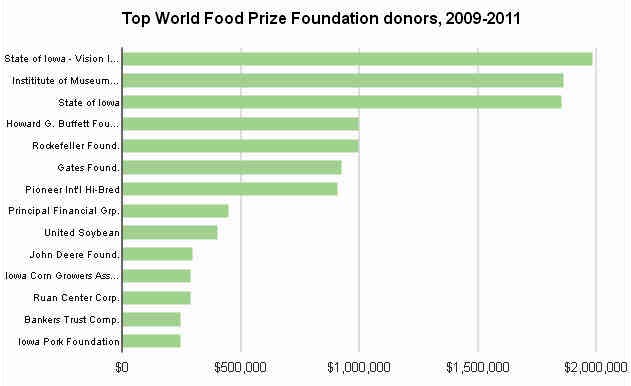
GRUB STREET
Each year, the World Food Prize Foundation awards a quarter-million dollars to someone who’s improved the quality, quantity, or availability of food. It sounds like a nice, fair idea, but Mother Jones reports that the prize’s “recipients have been champions of exactly the kind of industrial-scale agriculture that is the livelihood of the award’s corporate backers.” The U.S. government supports this not-so-democratic selection process: The State Department hosts the announcement ceremony, and the U.S. Department of Agriculture and the World Prize Foundation “consult regularly together.” Here are some things to keep in mind before the recipient is announced this afternoon.
1. Like the James Beard Awards are called the “Oscars of the food world,” the World Food Prize is often referred to as the “Nobel Prize of food.” But the World Food Prize was actually founded by Nobel Peace Prize winner Norman Borlaug in the eighties.
2. Since the ceremony is hosted by the State Department, John Kerry will announce the winner today! But that doesn’t mean it’s a fair playing field: “Funders of the foundation which backs it have a vested interest in promoting industrialized farming around the world.”
3. Between 2009 to 20111, combined donations to the World Prize from ADM, Cargill, Monsanto, and General Mills totaled over half a million dollars.
4. The Gates Foundation and the Rockefeller Foundation made combined donations of $1.93 million during that time, too. These big charities have their own agendas.
5. Prior winners have gone on to “blast critics of industrial agriculture” and serve on the advisory committee for DuPont, a global research- and technology-based science company.
6. It makes sense that the U.S. government supports this prize: “The Obama administration has been ramping up agricultural development as both a means of third-world poverty alleviation and a business opportunity for Americans.” In other words, the government is invested in foreign agribusiness — and, thus, this award.
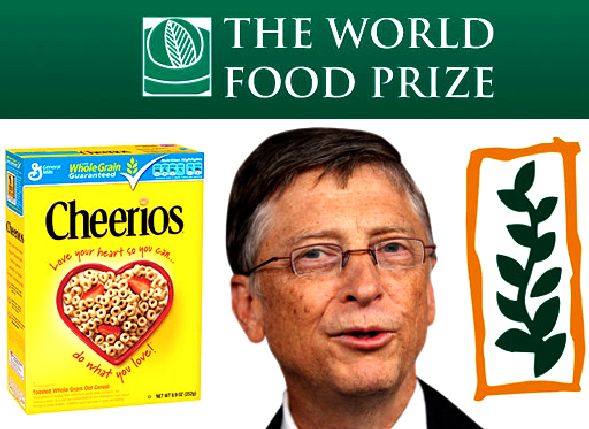

MOTHER JONES
Today Secretary of State John Kerry will announce the recipient of the quarter-million-dollar World Food Prize. Sometimes called "the Nobel Prize of food," the award has been handed out yearly since 1987 to "outstanding individuals who have made vital contributions to improving the quality, quantity or availability of food throughout the world," according to the website of its namesake foundation. Past winners have included agricultural scientists and presidents of developing nations who have made strides toward growing more food in their countries.
This is the 10th year that the State Department has hosted the World Food Prize's announcement ceremony; according to a Department press release, the event is intended to showcase "the administration's dedication to improving lives; counteracting suffering; and focusing on the role that science, technology and policy play in reducing hunger and under-nutrition." But while the US government's involvement might suggest that the prize is a neutral barometer of agricultural excellence, funders of the foundation which backs it have a vested interest in promoting industrialized farming around the world. In fact, many of the World Food Prize's major donors are among the biggest names in agribusiness today.
Out of 125 donors who contributed more than $500 between fiscal years 2009 and 2011 (the years for which the foundation's tax records are most readily available), 26 were either agribusiness or charities directly affiliated with agribusiness. Together, donations from these companies amounted to more than 28 percent of funds raised for that period, a Mother Jones analysis has found. The combined support of
ADM, Cargill, Monsanto, and General Mills alone for this period came to more than a half million dollars.
Powerful, policy-driving charities are also among the prize's top backers. The
Gates Foundation and the Rockefeller Foundation, whose mutual efforts launched the Alliance for a Green Revolution in Africa (AGRA) in 2006—made combined donations worth $1.93 million between 2009 and 2011.
The World Food Prize's connections to the US government also run deep. In 2004, Congress declared October 16 of that year (already known as World Food Day) "World Food Prize Day." Four years later, the US Department of Agriculture and the World Prize Foundation formalized their relationship, allowing the two organizations to "consult regularly together," according to Kenneth Quinn, a former US ambassador to Cambodia and the Foundation's president.
In recent years, many World Food Prize recipients have been champions of exactly the kind of industrial-scale agriculture that is the livelihood of the award's corporate backers. In a New York Times op-ed from 2009, Per
Pinstrup-Andersen, the prize's 2001 laureate, blasted critics of industrial agriculture, writing that
"[m]isguided, anti-science ideology and failure by governments to prioritize agricultural and rural development in developing countries brought us the food crisis."
The next year, Jo Luck and Pedro Sanchez, who won the prize in 2010 and 2002, respectively, began serving on a policy advisory committee for
DuPont. In 2011, the ex-Ghanaian president John Kufuor was awarded the prize for implementing "major economic and educational policies that increased the quality and quantity of food to Ghanaians." Kufuor's leadership also saw consolidation of the agriculture industry and increased investment from US agribusiness.
So why would the US government want to align itself with the World Food Prize? Several reasons: Ever since the 2007-08 food price spike that saw riots in cities throughout the developing world, the Obama administration has been ramping up agricultural development as both a means of third-world poverty alleviation and a business opportunity for Americans.
By the end of 2012, through a program called Feed the Future, the US government had disbursed more than $1 billion of $3.7 billion Congress had dedicated to "food security" initiatives in developing countries. But from its conception, Feed the Future wasn't just intended to help the world's poor. As Obama himself put it in May 2012 at the official unveiling of a related initiative, the New Alliance for Food Security and Nutrition, the idea behind this massive investment in agriculture abroad was to make poor countries—especially countries in Africa—more attractive to foreign agribusiness. African governments would "take the lead," he said, "by making tough reforms and attracting investment."
Yet as my colleague Tom Philpott has noted many times, considerable research has found that exporting America's agricultural practices to the third world may neither be the best investment in their resources, nor the path to food security.
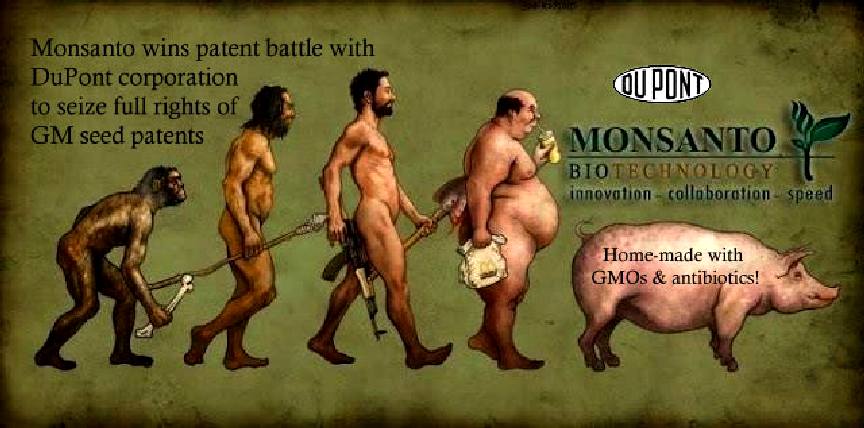
SEATTLE ORGANIC
RESTAURANTS - MONSANTO & DUPONT'S GMO WAR & BIOTECH MONOPOLY
The giant four biotech companies including Monsanto, DuPont, Syngenta and Dow own 80% of corn and more than 70% of soybeans. In less than 10 years the world largest seed company, Monsanto has been able to dominate the entire market. The aggressive policies of Monsanto and its monopoly over our seeds and food supply have pushed smaller farmers out of business.
As we covered last year, Monsanto has been suing DuPont for violation of Roundup license agreement back in 2002. Apparently, DuPont created its own pesticide called “Optimum GAT” that was supposed to compete with Monsanto’s Roundup Ready GM soy product. However, the Optimum GAT failed to function properly and DuPont violated the license agreement by adding Monsanto’s Roundup into their existing pesticide. So DuPont counter-sued Monsanto and accused Monsanto of its monopoly and restricted agriculture policies.
Recently, the fight between Monsanto and DuPont ended in favor of Monsanto and DuPont agreed to pay Monsanto its licensing fees.
According to phys.org, after four years of battle, DuPont finally agreed to pay Monsanto $1.75
billion royalty fee for the next 10 years. Apparently the previous court order required DuPont to pay Monsanto $1 billion for
patent violations. However, both Monsanto and DuPont decided to drop charges against one another and DuPont agreed to drop its antitrust charges against Monsanto. That will put Monsanto in a very high position of strength, considering that Monsanto owns more than 80% of US corn and soy license gene traits.
However, the two companies both agreed to work together and according to phys.org DuPont Pioneer President Paul Schickler said that "This technology exchange helps both companies to expand the range of innovative solutions we can offer farmers and to do so faster than either of us could alone".
According to phys.org, Monsanto’s president Brett Begemann said the deal "endorses the value of our next-generation soybean technologies." He also added that "This signals a new approach to our companies doing business together, allowing two of the leaders in the industry to focus on bringing farmers the best products possible while working to advance innovation and long-term opportunity for agriculture."
DuPont is the last company among the giant four biotech and chemical companies that decided to sign up to use Monsanto’s Roundup Ready GM soy traits. DuPont will also drop all the antitrust charges against Monsanto and will pay Monsanto $1.75 billion.
Now the four biotech companies including Monsanto, DuPont, Syngenta and Dow are linked by Monsanto’s license and have joined to work together to control and dominate the whole market.
Ironically President Obama recently signed the Continuing Budget Bill into law while a biotech rider under the deceptive title of The Farmer Assurance Provision was added to the bill that will exempt Monsanto from being held liable in Federal Courts.
However, one would think that Monsanto’s gang and its lobbyists are powerful enough to bribe their representative to present a bill to the President of US that includes issues such as budget bill and violence against Women’s Act but it also includes a rider that will exempt Monsanto from any future lawsuits. This is all happening when according to US Center for Food Safety Monsanto has sued 410 farmers and 56 small farms and has forced all of them to pay for Monsanto’s technology fee. Also 4,500 small farmers who could not afford to pay for legal representation were forced to pay $85 million to $160 million out of court settlements to Monsanto.
Also despite the warnings of many independent scientists, including Dr Huber, Monsanto’s weed killer Roundup is widely used in the United States and across the globe. In fact Roundup makes up for 43% of the company’s income while recent figures show that Monsanto’s sales and profit have gone up drastically due to increased prices of Roundup Ready Soy.
Recently, Monsanto joined the chemical company Dow to create a new row of GMO crops called "Agent Orange Corn" that is resistant to both Monsanto's Roundup and active ingredient of Agent Orange called 2,4-D. The active ingredient in Roundup called “glyphosate” has been linked to infertility, liver damage, birth defects, allergies,
cancer and nutritional deficiencies. 2,4-D in Agent Orange is also linked to health problems including cancer, liver toxicity, neurotoxicity, immune system disorder, Parkinson's disease and endocrine disruption.
So far Obama who during the 2008 Presidential election promised food transparency and policies that will lead America towards a nutritional food system has done nothing to lead America towards its goal. According to Chris Hedges, the author of Empire of Illusion, “President Obama does one thing and Brand Obama gets you to believe another. This is the essence of successful advertising."
Also Obama came to power by “change” slogan; however one would doubt that if anything is going to really change since partisanship,
Wall Street and corruption runs corporate America.
Many Critics believe that Monsanto’s domination over our seeds and food supply need a proper antitrust investigation but the truth is that few who have stood up against the Pesticide Empire and biotech tyranny had to pay a very high price.
So the question is what will it take for the Obama administration to grow some balls and stand up for the few basic rights hat we have left and keep his promises to label GMO?
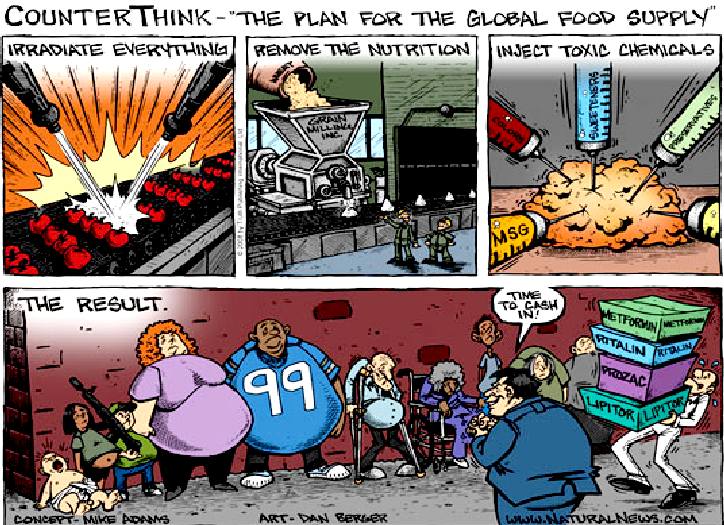
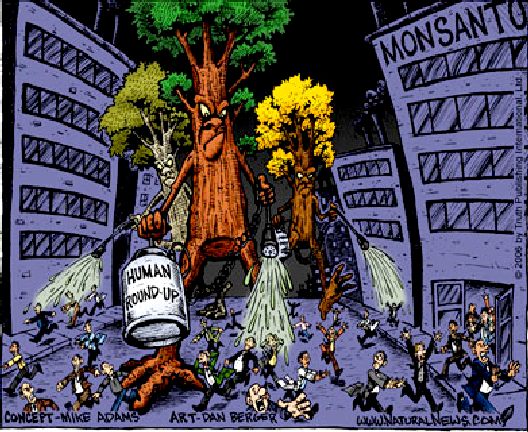
BY
LAND OR SEA?
The environmental challenges posed by agriculture are huge, and they’ll only become more pressing as we try to meet the growing need for food worldwide. We’ll likely have two billion more mouths to feed by mid-century
- more than nine billion people. But sheer population growth isn’t the only reason we’ll need more food. The spread of prosperity across the world, especially in China and
India, is driving an increased demand for meat, eggs, and
dairy, boosting pressure to grow more
corn and soybeans to feed more cattle, pigs, and chickens. If these trends continue, the double whammy of population growth and richer diets will require us to roughly double the amount of crops we grow by 2050.
Agriculture’s footprint has caused the loss of whole ecosystems around the globe, including the prairies of North America and the Atlantic forest of Brazil, and tropical forests continue to be cleared at alarming rates. But we can no longer afford to increase food production through agricultural expansion. Trading tropical forest for farmland is one of the most destructive things we do to the environment, and it is rarely done to benefit the 850 million people in the world who are still hungry. Most of the land cleared for agriculture in the tropics does not contribute much to the world’s food security but is instead used to produce cattle, soybeans for livestock, timber, and palm oil. Avoiding further deforestation must be a top priority.
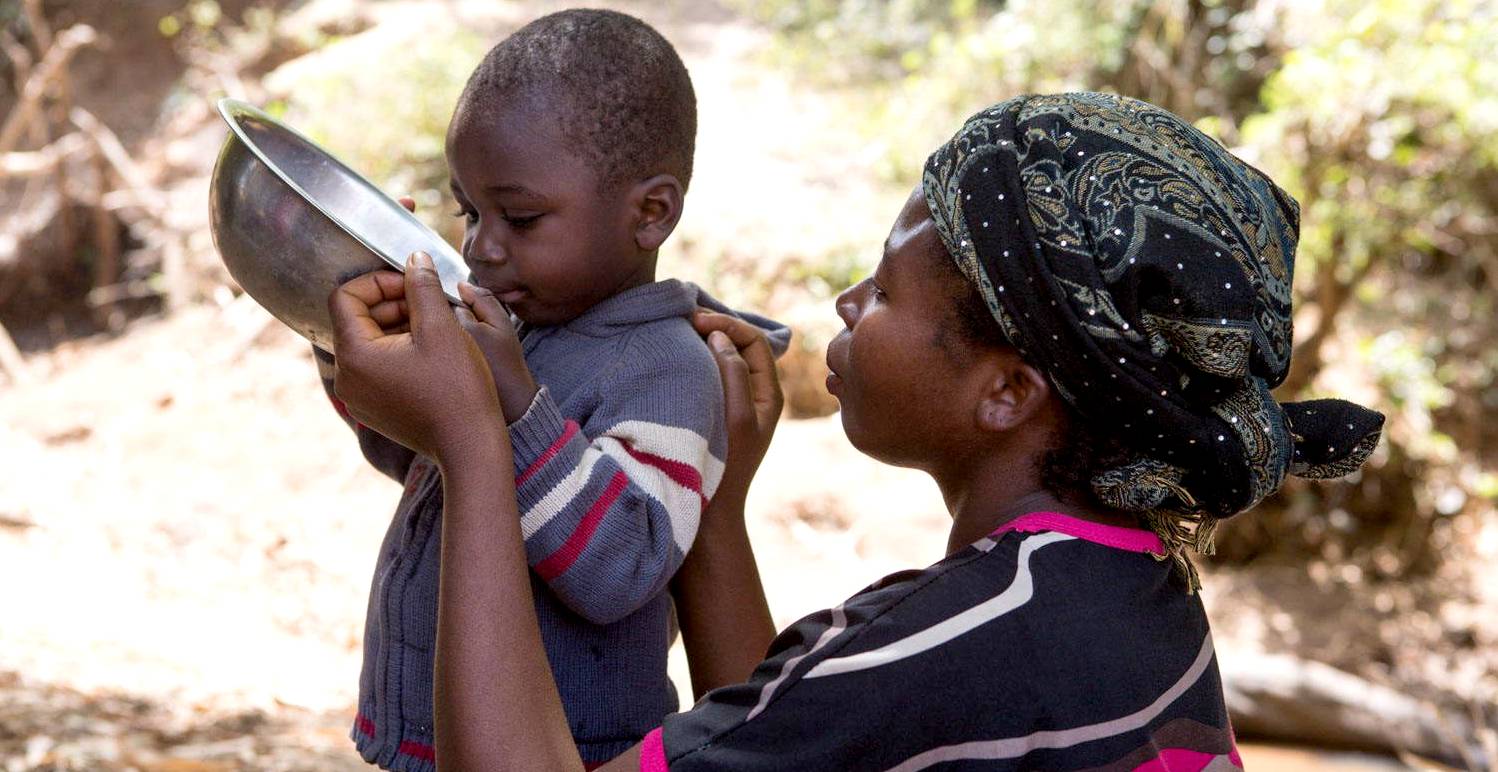
UN FOOD & AGRICULTURE - UNLOCKING THE POTENTIAL OF THE SEAS
Today’s fisheries sector hosts a multibillion dollar industry that is a vital source of food and nutrition, employment, trade, economic wellbeing and recreation.
The concept of a "blue economy" came out of the 2012 Rio+20 Conference and emphasizes conservation and sustainable management, based on the premise that healthy ocean ecosystems are more productive and a must for sustainable ocean-based economies.
To support a shift to this new approach, FAO launched the Blue Growth Initiative, through which it will assist countries in developing and implementing blue economy and growth agendas.
Why blue growth?
Blue growth looks to further harness the potential of oceans, seas and coasts to:
*
Eliminate harmful fishing practices and overfishing and instead incentivize approaches which promote growth, improve conservation, build sustainable fisheries and end illegal, unreported and unregulated fishing
* Ensure tailor-made measures that foster cooperation between countries
* Act as a catalyst for policy development, investment and innovation in support of food security, poverty reduction, and the sustainable management of aquatic resources.
How will it be implemented?
Aquaculture – promote policies and good practices for
farming of fish, shellfish and marine plants in a responsible and sustainable manner
Capture fisheries – support implementation of the Code of Conduct for Responsible Fisheries (CCRF) and related instruments to restore fish stocks, combat IUU and promote good fish production practices and growth in a sustainable manner
Seafood systems – promote efficient seafood value chains and improved livelihoods
Eco-system services – Promote regulatory regimes and approaches to restore vital coastal habitats, biodiversity and eco-system services (incl.
carbon capture,
storm and wave defenses, tourism etc).
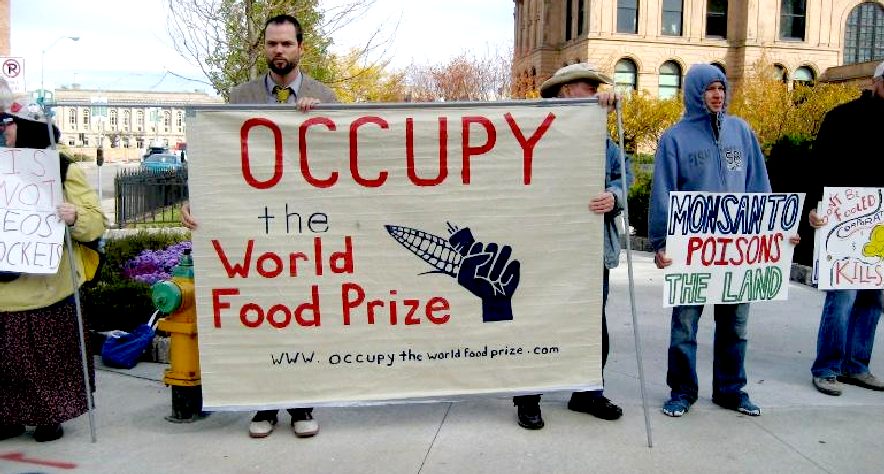
PROTEST -
Five arrested at protest of World Food Prize in Des Moines - Protestors stand with signs Wednesday outside the World Food Prize Hall of Laureates in Des Moines, Iowa.
WORLD
FOOD PRIZE PROTEST OCT 19 2012 - NATIONAL CATHOLIC REPORTER
Des Moines, Iowa
- According to Catholic Worker and peace activist Frank Cordaro, the World Food Prize award ceremony, which took place Thursday at Iowa's state capitol, was the perfect place to protest the global takeover of the food supply by large corporations.
"The world recognizes how important this award is, even if most Americans don't," he told NCR as he stood with other protestors Wednesday. The group stood outside the newly renovated World Food Prize Hall of Laureates, formerly the Des Moines Public Library, where the Rockefeller Foundation's endowment of the inaugural Norman Borlaug Award for Field Research and Application was awarded Wednesday night.
"The World Food Prize is being held at the state house of Iowa," he continued. "The state has given millions of dollars in support of it. People from all over the world come here. It is a very big deal."
Alongside Cordaro on a rainy, windy Iowa day, a group of like-minded supporters, several of them Catholic Workers from out of state, stood behind a banner that read, "Occupy World Food Prize." Their local organizer, Jessica Reznicek, a Des Moines native who took part in the Occupy Wall Street sit-ins, returned to the area several months ago to help organize the event.
"I was very disturbed by the World Food Prize narrative, and once I began to research it, I began to see behind the propaganda," said Reznicek, a member of the Des Moines Catholic Worker. "These corporations are not interested in feeding people. I believe [World Food Prize creator] Dr. [Norman] Borlaug was, but the corporations are doing the opposite. I have a problem with the way they look at feeding through a buying model rather than through the common good. They want complete countrywide domination."
Cordaro gets heated when he talks about feeding the poor.
"It's a scandal, an absolute scandal, in the way we feed the poor in this world," he said. "And the [non-governmental organizations] and humanitarian agencies who do feed them have to come to these corporations, begging for food to feed the poor. We should treat the poor better, and
the earth. We are raised to think we are doing the right thing and patting ourselves on the back."
As the wind picked up Wednesday afternoon, the protestors struggled to hold their signs upright as cars drove by, honking horns in support. By dusk, more than 30 people had joined the protest, and some used a bull horn to talk about their opposition to corporations they say dominate the global food network. Around 5 p.m., the protestors moved from the street, where they stood with their signs, to the entrance of the World Food Prize Hall of Laureates.
The group hoped to prevent dignitaries like United Nations Secretary General
Ban Ki-moon from entering the building and to disrupt that night's award ceremony.
When the protestors came onto the grounds, World Food Prize organizers and Des Moines police asked them to leave. Cordaro, Reznicek, Kaylynn Strain, Eddie Bloomer and Julie Brown, all from Des Moines, were arrested and charged with misdemeanor criminal trespass when they refused. The five were released later that evening. Cordaro was sentenced to 30 days in Polk County Jail; Renicek was fine
$500; Bloomer was sentenced to 15 days in Polk County Jail; and Brown was fined $250.
A second protest was planned for Thursday, when the World Food Prize was awarded to Israel soil scientist Dr. David Hillel.
By Sue Stanton, Ames, Iowa
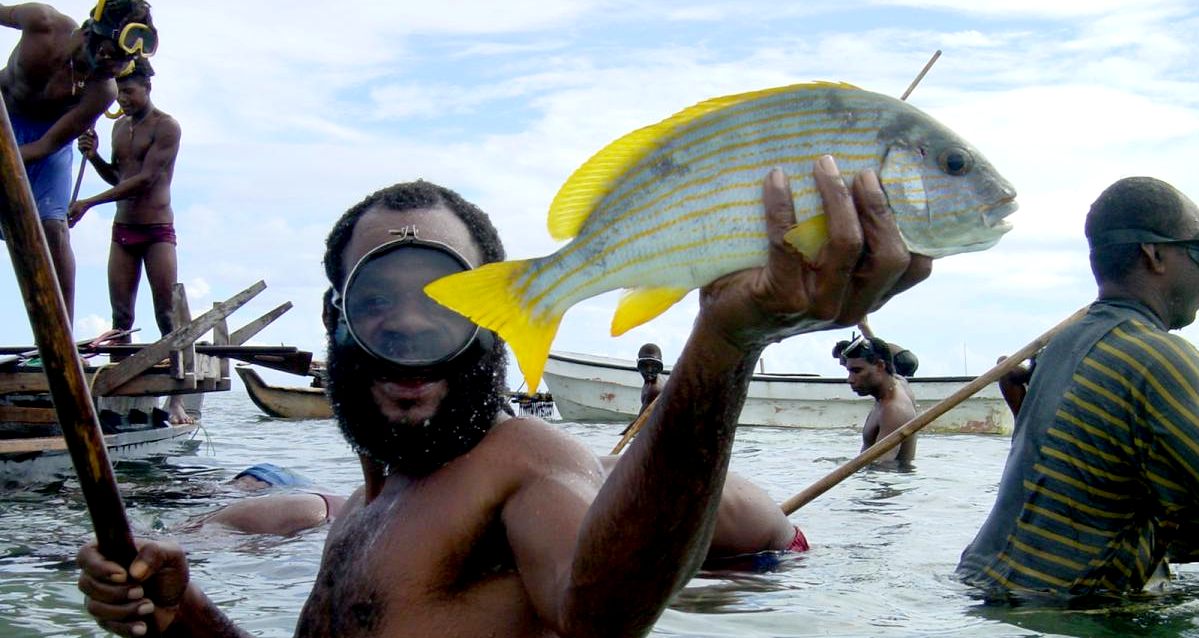
WILD
FISH - What is the most climate friendly way of feeding the world? Is
is agriculture or aquaculture. Wild fish feed roughly 10% of the world
population. Aquaculture is like breeding battery chickens. It's not good
for the chickens and the product is inferior to the real deal. One of the problems
with fishing is giant subsidized trawlers that rape the ocean. Local
fishing like that above is sustainable provided the fish are not poisoned
with plastic.
HOW
COULD SEAVAX HELP?
If
it is true that the fish in our oceans are declining at the rate of 0.8%
per year since 1970 (@27-12-16), then significant numbers of clean running ocean filtration
machines could make a significant contribution to restoring a healthy
environment for fish to breed in. We are developing a low cost system that
every country in the world might afford to operate - and eventually reap
the rewards of better food security. SeaVax can even be adapted to be a
fishing boat designed to produce low cost fish meal - but that is way in
the future. For now we simply want to fight against the build up of ocean
plastic. Read about what the experts have to say below and you might agree
with us that we should all pull together to conserve what we have. We are
hoping that this will include big hitters like President
Trump.
POPULATION GROWTH ESTIMATES
Current UN projections show a continued increase in population in the near future (but a steady decline in the
population growth rate), with the global population expected to reach between 8.3 and 10.9 billion by 2050. UN Population Division estimates for the year 2150 range between 3.2 and 24.8 billion; mathematical modeling supports the lower estimate. Some analysts have questioned the sustainability of further world population growth, highlighting the growing pressures on the environment, global food supplies, and energy resources. Solutions for feeding the nine billion in the future are being studied and documented. One out of every seven people on our
planet go to sleep hungry. People are suffering due to overpopulation, 25,000 people die of malnutrition and hunger related diseases everyday.
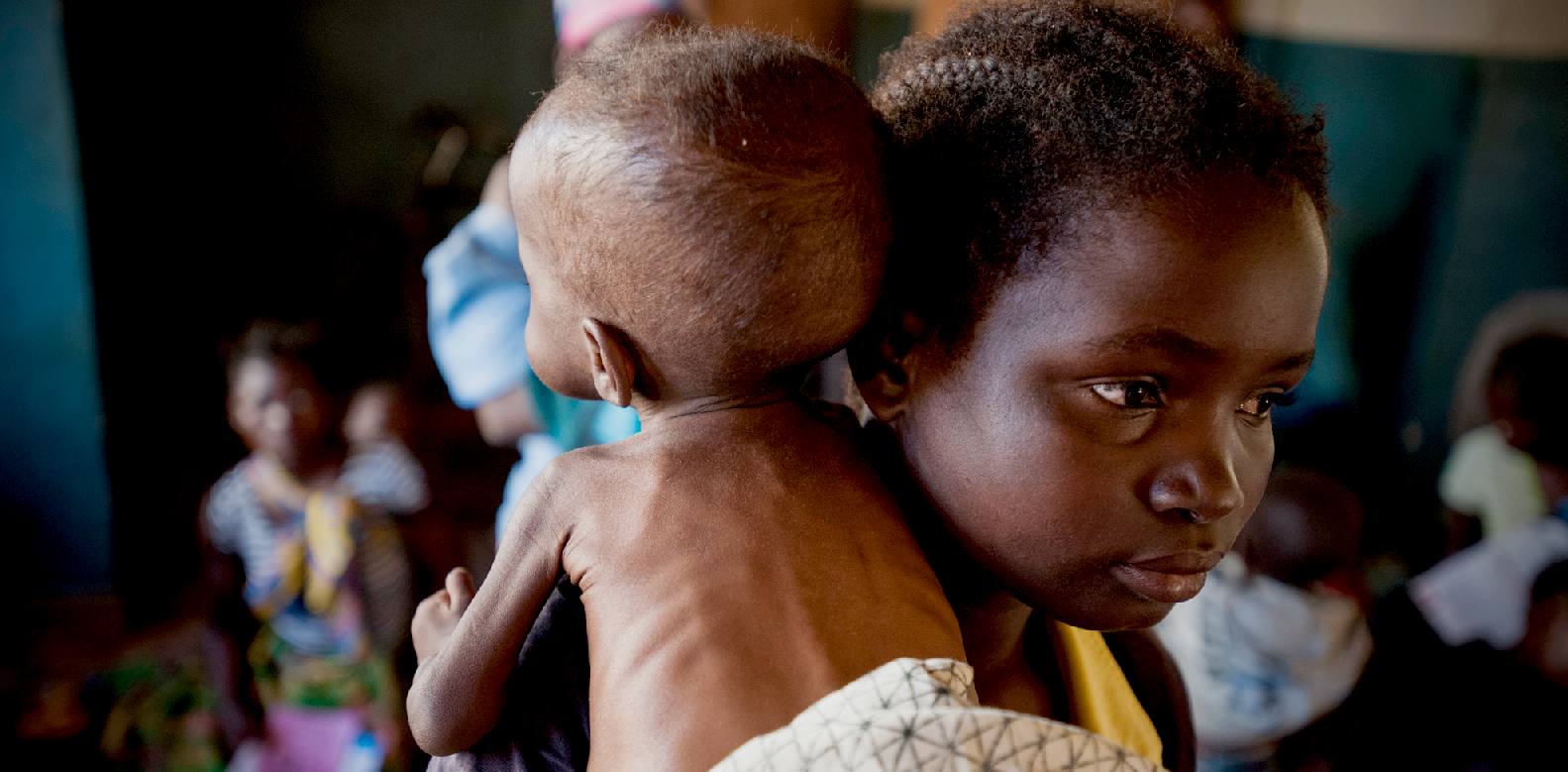
FEEDING
THE WORLD - It may not seem like it, but the Blue Economy underpins
food aid to third world countries. There is not enough arable land on
planet earth to feed the population as it expands into 2050.
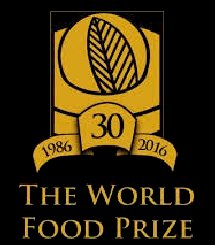
CONTACTS
The
World Food Prize
100 Locust Street
Des Moines, Iowa 50309 USA
Phone: (515) 245-3783
Fax: (515) 245-3785
Email: wfpf@worldfoodprize.org


SEE
THE LIGHT
- These pens are available in pink and teal in support of our SeaVax
"Feed The World" project. They have polished hard chrome barrels
and colored caps with our bird logo engraved into the cap. They have soft
silicone rubber tips for your mobile phone and
computer touch screens and
a built in LED torch at the opposite end - ideal for conferences,
theatres, clubs or doing your homework when the lights are low. They come
complete with batteries and gift boxes if this is a present for a loved
one (at a small extra cost).
WORLD
BANK
ON AQUACULTURE
A new World Bank report estimates that in 2030, 62% of the seafood we eat will be farm-raised to meet growing demand from regions such as
Asia, where roughly 70% of
fish will be consumed.
China will produce 37% of the world’s fish, while consuming 38% of world’s food fish.
By producing more seafood that is affordable and rich in nutrition, aquaculture can help improve
food security and livelihoods for the world’s poorest.
The rise in seafood demand gives countries the opportunity to expand and improve responsible fish and shellfish farming practices.
Nearly two-thirds of the seafood we eat will be farm-raised in 2030. This is according to
"Fish to 2030: Prospects for Fisheries and Aquaculture," which concludes that as sources from wild capture fisheries approach their maximum take, aquaculture
- or fish farming - will help satisfy the growing global appetite for fish and seafood.
The new World Bank report projects that in 2030, aquaculture will produce half of the world’s supply of fish, including fish for food and other products such as fishmeal.
Meanwhile, 62% of the seafood that will end up on people’s plates will come from fish farms, which will grow production to meet rising demand
- especially from Asia, where roughly 70% of fish will be consumed. In 2030, an emerging middle class in
China will become a particularly large market for fish. With increased investment in aquaculture,
China will produce 37% of the world’s fish and consume 38% of the fish the world eats, the report estimates.
| Year |
Laureates |
Nationality |
Achievement |
| 2016 |
Dr. Maria Andrade
Dr. Robert Mwanga
Dr. Jan Low |
Cape Verde
Uganda
United States |
Developed the biofortified
orange-fleshed sweet
potato at the CGIAR
International
Potato Center |
| Dr. Howarth Bouis |
United
States |
Founded HarvestPlus, a major NGO
in the development of biofortified crops primarily use
conventional breeding techniques. |
| 2015 |
Sir
Fazle Hasan Abed |
Bangladesh |
Founder of BRAC,
the world's largest NGO,
which is recognized for substantial work on reducing poverty
in Bangladesh and 10 other countries |
| 2014 |
Dr Sanjaya
Rajaram |
India
Mexico |
Developed 480 varieties of
disease resistant wheat |
| 2013 |
Dr Mary-Dell
Chilton,
Dr Robert
Fraley,
Dr Marc
Van Montagu |
United
States
United States
Belgium |
Developed science of modern
plant biotechnology
supporting improved sustainability and global food security |
| 2012 |
Dr Daniel
Hillel |
Israel |
Conceiving and implementing
micro-irrigation in arid and dry land regions |
| 2011 |
John
Agyekum Kufuor
Luiz
Inácio Lula da Silva |
Ghana
Brazil |
Creating and implementing
government policies to alleviate hunger and poverty in their
countries |
| 2010 |
David Beckmann
Jo
Luck |
United
States |
Building Bread
for the World and Heifer
International into two of the world's foremost
grassroots organizations leading the charge to end hunger
and poverty around the globe. |
| 2009 |
Gebisa
Ejeta |
Ethiopia |
Developing Africa's first sorghum
hybrids resistant to drought
and the parasitic witchweed. |
| 2008 |
Bob
Dole
George
McGovern |
United
States |
Leading and encouraging a
global commitment to school feeding, which has enhanced
school attendance and nutrition for millions of the world's
poorest children, especially young women and girls. |
| 2007 |
Dr Philip
E. Nelson |
United
States |
Revolutionizing food
processing, packaging, transportation, and distribution by
perfecting bulk aseptic packaging technology and spreading
the technology worldwide. |
| 2006 |
Edson
Lobato,
His Excellency Alysson
Paolinelli,
Dr A.
Colin McClung |
Brazil
Brazil
United States |
Pioneering work in soil
science and policy implementation that opened the vast Cerrado
region of Brazil to agricultural and food production. |
| 2005 |
Dr Modadugu
Vijay Gupta |
India |
Development and dissemination
of low-cost techniques for freshwater fish
farming (using tilapia
species) by the rural poor. |
| 2004 |
Prof. Yuan
Longping |
China |
Development of hybrid
rice
varieties |
|
Dr Monty
Jones |
Sierra
Leone |
Development of New
Rice for Africa (NERICA), with the potential to increase
rice yields in Africa. |
| 2003 |
Catherine
Bertini |
United
States /
United Nations |
Transforming the World
Food Programme from a development assistance program to
the largest and most effective humanitarian food relief
organization |
| 2002 |
Dr Pedro
A. Sanchez |
United
States /
Cuba |
Development of methods to
restore fertility
to degraded soils in Africa and South
America. |
| 2001 |
Dr Per
Pinstrup-Andersen |
Denmark |
Establishment of "Food
For Education" programs in which families receive food
subsidies when children stay in school. |
| 2000 |
Dr Evangelina
Villegas,
Dr Surinder
K. Vasal |
Mexico
India |
Developing high quality
protein maize (QPM). |
| 1999 |
Dr Walter
Plowright |
United
Kingdom |
Developing a vaccine against
the cattle plague rinderpest. |
| 1998 |
Dr B.
R. Barwale |
India |
Founder of independent seed
company Mahyco,
strengthening seed
supply and distribution throughout India. |
| 1997 |
Dr Ray
F. Smith,
Dr Perry Adkisson |
United
States
United States |
Developing the concept of Integrated
Pest Management (IPM) which employs various techniques
to protect crops from insect damage in an environmentally
sustainable manner. |
| 1996 |
Dr Henry
Beachell,
Dr Gurdev
Khush |
United
States
India |
Developing "miracle
rice" varieties that doubled rice
production in Asia since their development. |
| 1995 |
Dr Hans
Rudolf Herren |
Switzerland |
Developing a pest control
program for the cassava
mealybug,
which could destroy African cassava
crop. |
| 1994 |
Dr Muhammad
Yunus |
Bangladesh |
Founder of the Grameen
Bank in Bangladesh, developed innovative small loan
programs for the poor, providing millions of people access
to more food and better nutrition. |
| 1993 |
He Kang |
China |
Initiation of reforms while
head of the Ministry of Agriculture which made China
self-sufficient for food production. |
| 1992 |
Dr Edward
F. Knipling,
Raymond C. Bushland |
United
States
United States |
Developing the sterile
insect technique (SIT) to control insect parasites that
harm the world's food supply. |
| 1991 |
Dr Nevin
S. Scrimshaw |
United
States |
Human nutrition studies that
led to the use of protein-rich food products to combat
malnutrition in developing countries. |
| 1990 |
Dr John
Niederhauser |
United
States |
Discovering a durable
resistance to potato
late blight. |
| 1989 |
Dr Verghese
Kurien |
India |
Founder of Operation
Flood the largest agricultural development program in
the world made the farmer the owner of his cooperative,
cutting out middlemen. India emerged as the largest producer
of milk in 1998 from milk scarcity when he started. |
| 1988 |
Dr Robert
F. Chandler |
United
States |
Founding leadership of the International
Rice Research Institute and his dedication to developing
tropical rice
varieties that doubled and tripled the yields of traditional
varieties. |
| 1987 |
Prof. M.
S. Swaminathan |
India |
Introducing high-yielding wheat
and rice varieties to India starting India's Green
Revolution. |
|
ACIDIFICATION
- ADRIATIC
- ARCTIC
- ATLANTIC - BALTIC
- BAY BENGAL - BERING
- CARIBBEAN - CORAL - EAST
CHINA
ENGLISH CH
-
GOC - GUANABARA
- GULF
GUINEA - GULF
MEXICO
- INDIAN
-
IRC - MEDITERRANEAN -
NORTH SEA - PACIFIC
- PERSIAN GULF - SEA
JAPAN - STH
CHINA - PLASTIC
- PLANKTON - PLASTIC
OCEANS - SEA
LEVEL RISE - UNCLOS
- UNEP
WOC
- WWF
AMAZON
- BURIGANGA - CITARUM - CONGO - CUYAHOGA
-
GANGES - IRTYSH
- JORDAN - LENA -
MANTANZA-RIACHUELO
MARILAO
- MEKONG - MISSISSIPPI - NIGER - NILE - PARANA - PASIG - SARNO - THAMES
- YANGTZE - YAMUNA - YELLOW
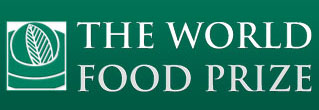


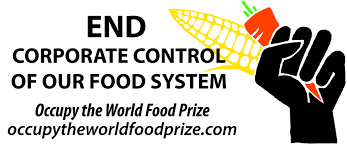

FOOD
SECURITY LINKS
& REFERENCE
Twitter
world food prize Facebook-The-World-Food-Prize Youtube
World Food Prize http://www.grubstreet.com/2013/06/world-food-prize-politics.html http://www.motherjones.com/blue-marble/2013/06/why-did-john-kerry-announce-world-food-prize http://www.seattleorganicrestaurants.com/vegan-whole-food/Monsanto-DuPont-GMO-war-monopoly.php https://www.theguardian.com/global-development/2015/jul/02/brac-sir-fazle-hasan-abed-wins-2015-world-food-prize-reducing-poverty http://www.bbc.co.uk/news/science-environment-37619154 http://www.gatesfoundation.org/ https://en.wikipedia.org/wiki/World_Food_Prize https://twitter.com/worldfoodprize https://www.facebook.com/pages/The-World-Food-Prize/51072466793 https://www.youtube.com/user/WorldFoodPrize
http://www.centerforoceansolutions.org/
https://www.unicef.org.uk/what-we-do/life-saving-food/ http://www.nationalgeographic.com/foodfeatures/feeding-9-billion/ https://www.worldfoodprize.org/
http://seedfreedom.in/celebrate-the-real-world-food-prize-honour-real-food-heroes/
https://www.ncronline.org/news/peace-justice/five-arrested-protest-world-food-prize-des-moines
https://www.ncronline.org/authors/sue-stanton
https://www.ncronline.org/news/global/developer-drip-irrigation-technique-wins-world-food-prize
https://www.ncronline.org/blogs/eco-catholic/world-food-prize-winners-receiving-award-efforts-biofortify-foods
http://www.canwefeedtheworld.org/
https://www.ncronline.org/news/global/developer-drip-irrigation-technique-wins-world-food-prize
https://en.wikipedia.org/wiki/World_Food_Programme https://en.wikipedia.org/wiki/Food_security http://www.worldbank.org/en/topic/foodsecurity/ http://www.foodsecurity.ac.uk/

TORCH
PENS
- These pens are available in pink and teal in support of our SeaVax
"Feed The World" project. They have polished hard chrome barrels
and colored caps with our bird logo engraved into the cap. They have soft
silicone rubber tips for your mobile phone and computer touch screens and
a built in LED torch at the opposite end - ideal for conferences,
theatres, clubs or doing your homework when the lights are low. They come
complete with batteries and gift boxes if this is a present for a loved
one. These limited edition pens are awarded to benefactors who donate
$10,000 dollars to ocean cleaning research.
|


























